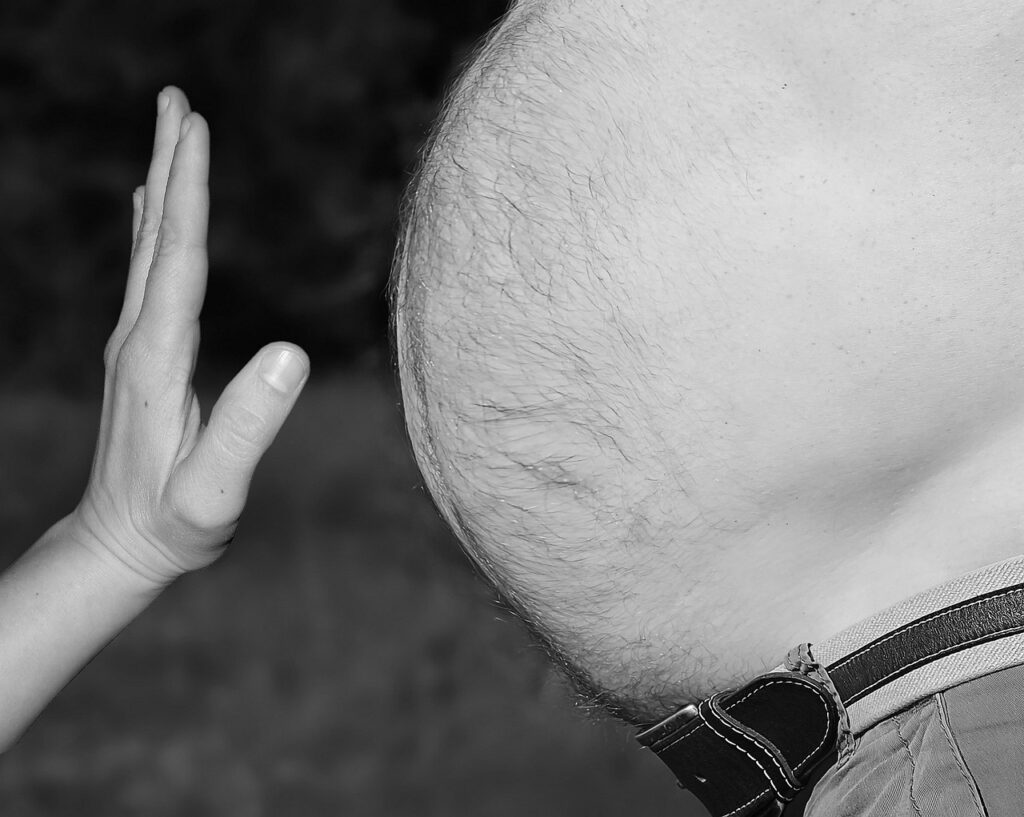How To Get Rid of Stress Belly Fat. Causes, Risks and Foods to Avoid

Stress belly fat is not a major diagnosis, but it’s about how stress and stress hormones can affect your weight, especially your belly fat involves a combination of a healthy diet, regular exercise, and stress management techniques. Some effective stress management techniques include deep breathing, meditation, yoga, and getting adequate sleep. Additionally, reducing alcohol and caffeine intake and incorporating stress-reducing activities, such as spending time in nature or engaging in hobbies, can also help.
Losing belly fat involves a combination of a healthy diet, regular exercise, stress management, and healthy lifestyle habits. By making small changes to your daily routine, you can gradually lose weight and reduce belly fat over time. (1)
It can be challenging, but it is possible with the right approach.
Strategies to Lose Stress Belly Fat
Here are some strategies that can help you lose belly fat:
Eat A Healthy Diet
Eating a diet that is high in whole foods, such as fruits, vegetables, lean proteins, and whole grains, and low in processed and sugary foods can help you lose belly fat. Additionally, reducing your calorie intake slightly can help you create a calorie deficit, which is necessary for weight loss.
A healthy and restricted diet plays a major role in overall weight loss. There are numerous diets which directly help you to lose belly fat. It would be better if you prepare your meal in less quantity and also serve it on small plates.
Exercise Regularly
Engaging in regular physical activity can help you burn calories and lose belly fat. It can help in reducing stress hormones and you will feel energetic from inside. Regular exercise is a key component in reducing stomach fat and improving overall health. Many different types of exercises can be effective for losing stomach fat, and a combination of cardio, strength training, and core exercises are often recommended.

Cardiovascular exercises, such as running, cycling, swimming, or brisk walking, are effective in burning calories and reducing overall body fat, including stomach fat. These exercises increase the heart rate and breathing, leading to a higher calorie burn. It is recommended to perform cardio exercises at least 3-4 times a week for 30-60 minutes to see significant results.
High-intensity interval training (HIIT) is another effective exercise for reducing stomach fat. HIIT workouts are known to be more effective than steady-state cardio since they can burn extra calories in a briefer time. Studies have shown that HIIT can be especially effective in reducing belly fat.
Strength training, such as weightlifting or bodyweight exercises, is also important for reducing stomach fat. Building muscle mass can increase metabolism and help burn more calories throughout the day. So apart from helping in reducing belly fat it helps in controlling stress factor which is actual cause of stress belly fat.
Reduce Stress to Get Rid of Stress Belly
High levels of stress can increase levels of the hormone cortisol, which is associated with weight gain and belly fat. By reducing stress, cortisol levels can decrease, leading to a decrease in belly fat storage.
Stress can cause people to engage in emotional eating, which can lead to over consumption of unhealthy, high-calorie foods that contribute to belly fat. By reducing stress, people can avoid turning to food as a way to cope with negative emotions, which can lead to healthier eating habits and ultimately weight loss. Engaging in stress-reducing activities, such as meditation or yoga, can help you manage stress and reduce belly fat.
Reducing stress can help people to get better quality sleep. Lack of sleep has been linked to an increase in belly fat, as sleep deprivation can cause hormonal imbalances and increased appetite. By reducing stress and improving sleep quality.
Drink Plenty of Water
Drinking enough water can help you stay hydrated and reduce bloating, which can make your belly appear slimmer. Drinking water can help to reduce appetite and promote feelings of fullness, which can lead to consuming fewer calories overall.
Studies have shown that drinking water before a meal can leads reduction in calorie intake and may aid in weight loss.
Staying hydrated can help to improve digestion and reduce bloating. When the body is dehydrated, it tends to retain water, which can cause bloating and a puffy appearance around the stomach area. Drinking plenty of water can help to flush out excess water and reduce bloating.
Water can help to increase metabolism and promote fat burning. Studies have shown that drinking water can temporarily increase the body’s metabolic rate, leading to more calories burned and potentially aiding in weight loss.
Limit Alcohol Intake
Drinking too much alcohol can contribute to belly fat, so it is important to limit your intake. Alcoholic drinks are often high in calories and sugar, which can contribute to weight gain, especially around the belly area. By reducing alcohol intake, people can reduce their overall calorie and sugar intake helps in losing belly fat.
Alcohol consumption can lead to increased appetite and unhealthy food choices. Studies have shown that people tend to eat more when consuming alcohol, and they also tend to choose high-calorie, unhealthy foods. By limiting alcohol intake, people can avoid these unhealthy eating habits, leading to healthier food choices and potentially aiding in weight loss.
While drunk, it can interfere with the body’s ability to burn fat. When alcohol is consumed, the liver focuses on breaking down the alcohol instead of burning fat, which can lead to an increase in belly fat storage. By limiting alcohol intake, the liver can focus on burning fat and aiding in weight loss.
Losing belly fat involves a combination of a healthy diet, regular exercise, stress management, and healthy lifestyle habits. By making small changes to your daily routine, you can gradually lose weight and reduce belly fat over time.
What Are the Risks of Stress Belly Fat?
Belly fat, especially deep belly fat (visceral fat), can increase the risk of several health problems. Here are some of the risks associated with belly fat:
Deep Belly Fat
Deep belly fat, also known as visceral fat, is a type of fat that is located deep inside the abdominal cavity, surrounding internal organs such as the liver, pancreas, and intestines. Unlike subcutaneous fat, which is the fat located just beneath the skin, visceral fat is not visible and can only be detected by medical imaging techniques such as CT scans or MRIs. (2)
Visceral fat is considered to be more harmful to health than subcutaneous fat, as it is associated with an increased risk of several health conditions such as type 2 diabetes, heart disease, and certain types of cancer.
This is because visceral fat produces hormones and inflammatory substances that can interfere with the body’s normal functioning and contribute to the development of chronic diseases. Reducing visceral fat requires a combination of a healthy diet, regular exercise, and stress management techniques.
- Type 2 diabetes
- Heart disease
- Stroke
- Certain types of cancer
- Sleep deprives
- Fatty liver disease
- Joint problems
- Depression
Reducing belly fat through a combination of a healthy diet, regular exercise, and stress management techniques can help reduce the risk of these health problems.
Which Food Can Cause Belly Fat
There is no one specific food that causes belly fat. Belly fat can be caused by a variety of factors, including consuming more calories than you burn, a sedentary lifestyle, genetics, hormonal imbalances, and stress. However, consuming a diet high in refined carbohydrates, sugar, and saturated fats may contribute to the development of belly fat over time if consumed in excess. It’s important to maintain a balanced and healthy diet, along with regular exercise, to maintain a healthy weight and reduce the risk of belly fat.
However, certain types of food when consumed in excess can contribute to the accumulation of belly fat. These include:
Foods High in Added Sugars
Foods are high in added sugar such as soda, candy, and baked goods. When you consume foods high in added sugars, such as candy, soda, and baked goods, your body releases insulin to help regulate your blood sugar levels. When there is excess sugar in your bloodstream, your body converts it into fat and stores it in your fat cells.

Consuming a diet high in added sugars regularly can lead to increased fat storage, including in the stomach area. Additionally, high sugar intake can contribute to inflammation and insulin resistance, which can also contribute to the accumulation of stomach fat.
Refined Carbohydrates
Refined carbohydrates such as white bread, pasta, and rice. These foods can cause a spike in blood sugar levels, which may lead to the development of insulin resistance, which in turn can lead to belly fat.
When you consume refined carbs in excess, your body may release too much insulin, which can cause your blood sugar levels to drop rapidly. This can lead to increased hunger and cravings for more refined carbs, which can contribute to overeating and weight gain, particularly in the abdominal area.
Additionally, refined carbs are often low in fibre and nutrients, which can leave you feeling hungry and unsatisfied after meals. This can lead to overeating and weight gain, particularly in the abdominal area, where fat is easily stored.
Trans Fats
Trans fat such as fried foods, pastries, and packaged snacks. Consuming trans fats can contribute to the development of abdominal or stomach fat in several ways.
First, trans fats can increase inflammation in the body, which can lead to insulin resistance and the accumulation of fat in the abdominal area.
Second, trans fats can interfere with the body’s ability to metabolize fat, leading to the storage of fat in fat cells, including those in the abdominal area.
Third, trans fats can also increase levels of LDL or “bad” cholesterol in the body while reducing levels of HDL or “good” cholesterol.
This can lead to the formation of plaque in the arteries, which can restrict blood flow and lead to the accumulation of fat in the abdominal area.
Alcohol
Drinking excessive amounts of alcohol can contribute to the development of belly fat, as alcohol is high in calories and can lead to an increase in appetite and food consumption.
While these foods can contribute to belly fat, it’s the overall diet and lifestyle that is the most important factor in the development of excess belly fat. (3)
Probiotics And Supplements for Stress Belly Fat
Probiotics
One study found that consuming a probiotic supplement containing Lactobacillus gasseri for 12 weeks led to a modest reduction in belly fat in overweight adults.

Consuming a probiotic supplement containing Lactobacillus rhamnoses for 12 weeks reduced body weight and belly fat in women with overweight and obesity.
Some Examples of Supplements for Weight Loss
There is no single supplement that can target and reduce belly fat on its own. However, some supplements may support weight loss efforts and contribute to a reduction in belly fat when combined with a healthy diet and regular exercise.
Some supplements that have been studied for their potential effects on weight loss and belly fat reduction include:
Conjugated Linoleic Acid (CLA)
Some studies suggest that CLA, a type of fatty acid, may have a small but significant effect on reducing belly fat in overweight and obese adults when taken at doses of 2.4-6.8 grams per day.
Green Tea Extract
Green tea contains compounds called catechins that may help increase metabolism and fat burning. Some studies suggest that green tea extract supplements may modestly reduce body weight and belly fat in overweight and obese adults.
Protein Supplements
High-protein diets have been shown to support weight loss and may reduce belly fat. Adding protein supplements, such as whey protein, to your diet may help increase feelings of fullness and promote weight loss.
Fibre Supplements
Fibre supplements, such as glucomannan, may help reduce appetite and promote feelings of fullness, which can contribute to weight loss.
Supplements alone are not a magic solution for weight loss and belly fat reduction. To achieve sustainable results, it’s important to combine supplements with a healthy diet, regular exercise, and other lifestyle changes. (4)



